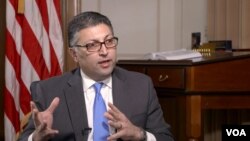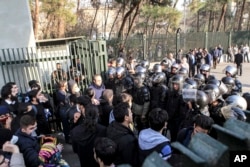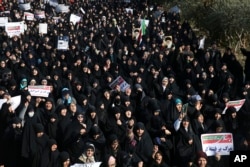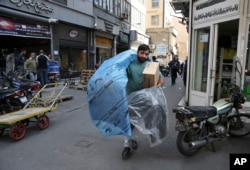The Trump administration's highest-ranking Iranian-American, who serves as its top antitrust regulator, has welcomed recent anti-government protests in Iran as a "heartening" development.
In an interview with VOA Persian this month, Makan Delrahim described the weeklong anti-government protest movement as a "natural progression" for Iranian people, whom he said desire freedoms that have been denied to them by "oppressive" Islamist clerics who have ruled Iran for almost 40 years.
"It is heartening to watch the Iranian people go through this [protest movement]," Delrahim said. "You hope for the best at the end of it, [but] who knows what happens."
Delrahim has served as U.S. assistant attorney general for the Justice Department's antitrust division since September. In that role, he enforces U.S. antitrust laws in cases of mergers and acquisitions that raise concerns about anti-competitive business practices.
His office is engaged in a high-profile federal lawsuit to try to block U.S. telecom giant AT&T's proposed takeover of American media conglomerate Time Warner. AT&T has vowed to fight the lawsuit in a court hearing scheduled for March.
Prior to the Trump administration, the 48-year-old Delrahim worked on antitrust issues for former President George W. Bush's administration, and spent time in corporate law as an attorney for several major technology companies including Google.
In his conversation with VOA Persian, Delrahim expressed disappointment with the Iranian government's efforts to block people from using digital communication tools as part of its crackdown on the nationwide protests, which began on December 28.
"I think any country that tries to limit people's access to technologies that improve their lives, does that to their own ultimate disadvantage," Delrahim said.
He compared such restrictive practices to the U.S., where he said people have intellectual freedom to express themselves, creating an environment that makes innovation and commerce possible.
"I would hope that it would be different in Iran … so that people have the ability to express their views, whatever they might be," he said.
Iranian leaders declared an end to the protest movement last week, after deploying thousands of security personnel and mobilizing thousands of their own supporters on streets around the country. Authorities said at least 21 people were killed as some confrontations between anti-government protesters and security forces turned violent.
Earlier this week, Iranian lawmakers said one of the hundreds of protesters detained in the unrest had died in custody. The circumstances of 22-year-old Sina Ghanbari's death were not clear.
Delrahim also spoke about Iran's Islamic Revolutionary Guard Corps, a military force whose corporate ownership of key Iranian industries has led critics to portray it as a monopoly that hurts the economy.
"[This] is not something that touches on the issue of antitrust law, but I do have some personal views," he said, in reference to the economic power of the IRGC.
"It is a shame because it limits the ability of the Iranian economy to grow into the 21st century," he said. "Iran has the intellectual resources and capacity to be one of the great countries, with some of the best medicine, technological innovations, software companies, medical devices and manufacturing — if they [the Iranian leadership] would allow that. Anytime you have limitations on that [economic potential], I am sure it is good for some of those folks who probably are doing very well, but really at the cost of the people of Iran."
Iran's GDP
An International Monetary Fund report published in December said Iran's real gross domestic product is forecast to grow by 4.2 percent in 2017/2018. It said Iranian economic growth could be "sustained or rise toward 4.5 percent over the medium-term if financial sector reform takes hold."
The IMF report said "removal of obstacles to private sector development would allow growth to become more diversified, resilient and job intensive." It also said Iran "needs to reduce red tape, reform state-owned enterprises and improve transparency about corporate beneficial ownership to attract investment and develop the private sector."
Delrahim was born in Iran to a Persian-Jewish family and immigrated to the United States with his family at the age of 10. He said Iranian immigrants to the U.S. in recent decades have included entrepreneurs and scientists whom he said would have been "phenomenal treasures" for Iran if they had stayed in their homeland and had the ability to travel freely between the two countries.
"As somebody who has a desire to go back and experience the culture and history of the country once again," he said, "it is an exciting time to watch [Iran's latest anti-government protests]."







